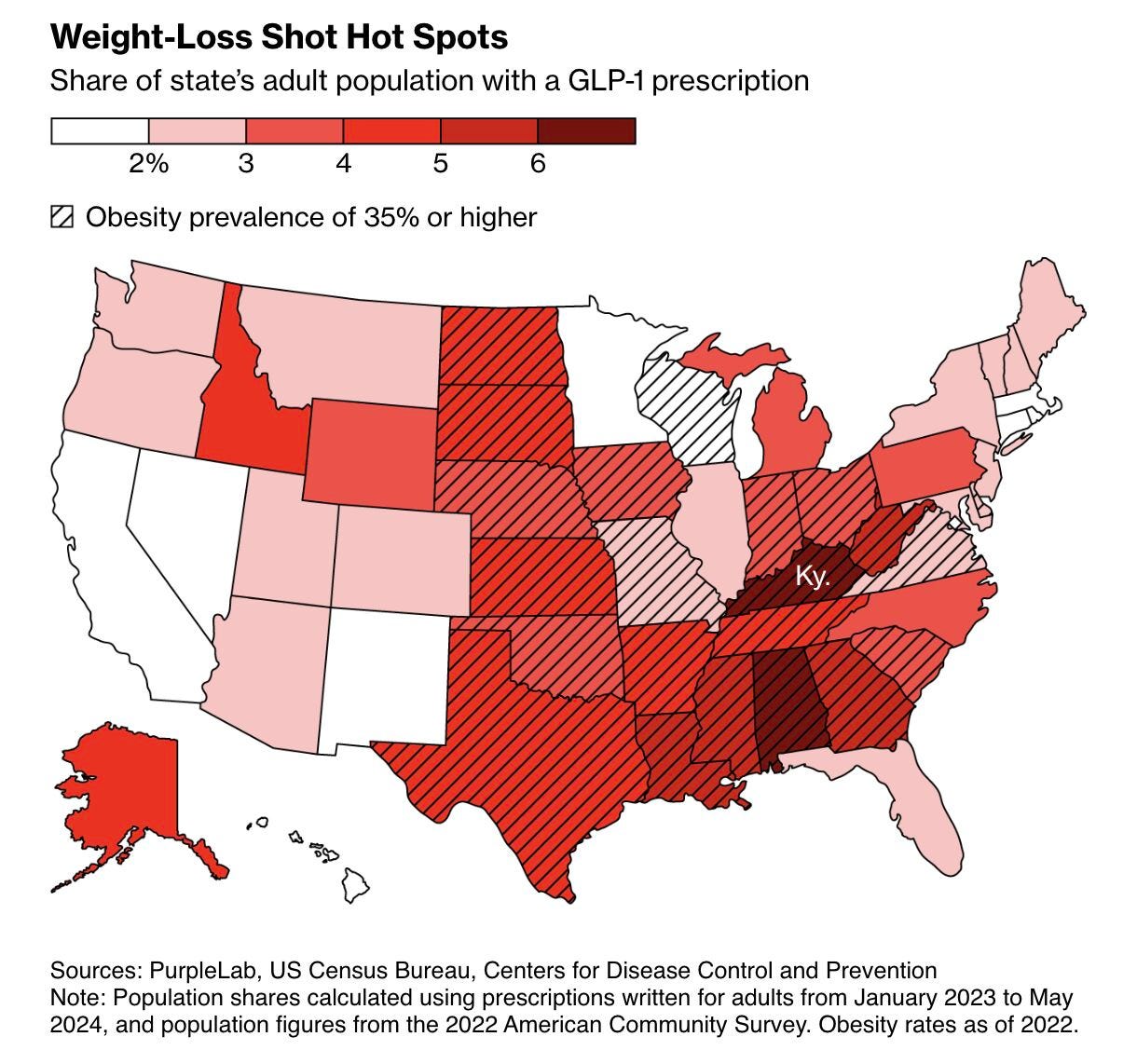GSV’s weekly insights on the global growth economy. Join our community of entrepreneurs, investors, executives, educators, and students getting a window to the future by subscribing here:
EIEIO…Fast Facts
Entrepreneurship: 40 – The number of Nvidia employees who report directly to Co-Founder & CEO Jensen Huang. (Tom’s Hardware)
Innovation: 50 – The number of times the S&P 500 has closed at an all-time high so far this year. (The Kobeissi Letter)
Education: ~$250 million – The amount of money the University of Michigan has poured into D.E.I. since 2016. (New York Times)
Impact: 34 years old – The median audience age for podcasts in 2024, compared to 70 years old for cable news. (No Mercy / No Malice)
Opportunity: >200,000 – The number of small businesses listed for sale each year, only 30% of which find a buyer. (Teamshares)
“Quitting smoking is easy. I’ve done it hundreds of times.” – Mark Twain
“You can get the monkey off your back, but the circus never leaves town.” – Anne Lamott
“I tried to drown my sorrows in alcohol, but the bastards learned to swim.” – Frida Kahlo
“We’ll all turn out just fine…If we take it one day at a time.” – Maggie Moe (My Pet Dragon)
In an instant, life can change forever.
A car runs through a red light and crashes into another automobile, crippling the other driver.
A hurricane devastates a community, leaving residents homeless and losing a lifetime of possessions.
A cyber hack fools a bank, losing millions in the blink of an eye.
Or from a positive standpoint, serendipitously sitting next to Mr. or Mrs. Right in Econ 101.
Our family’s life-changing moment came from a tick bite in Wisconsin.
Upon coming back to California from a family vacation in the land of the Cheeseheads, my daughter Maggie didn’t feel quite right. Doctors initially diagnosed her issues as juvenile arthritis. Then it was ADHD. Next, the experts told us she was bipolar.
By the time an army of medical personnel (actually my wife) figured it was Lyme Disease, it was five years later and Maggie couldn’t walk around the block. Given her incapacitated medical condition, she dropped out of high school her sophomore year.
Through a combination of Western and Eastern treatment, Maggie was healthy enough in a couple of years to get her GED and go off to college. She continued to experience some medical issues, but we thought that was part of the Lyme recovery process, and she was basically living her life.
After graduation, Maggie moved to Los Angeles to pursue a career in theater but she was a frequent patient at the emergency room at the local hospital. We moved her home so we could be on top of what we thought was just her Lyme returning with a vengeance.
Thank God we did this because what we saw firsthand was a person who was spiraling out of control. The opioid pain medication that she had been prescribed for 10 years to deal with her chronic illness had taken over her life.
One of the saddest days for me was when I had the talk with Maggie. I was telling her she had a big problem, but we were going to get her help to fix it, and without actually saying it, the look she gave me said, “Why did it take you so long for you to figure it out?”
The next day we were on a flight to Rancho Mirage where Maggie would be a patient at Betty Ford.
She’s been nearly nine years sober.
48.5 million people in the United States battle substance abuse. For context, that’s basically the population of California, Oregon, and Washington…combined.
When you consider how addiction affects the families, friends, and colleagues of those who suffer from it, you realize that it essentially impacts everyone.
107,543 people died of a drug overdose last year, and many of those were young people going into the prime of their lives. Ten percent of all people prescribed painkillers become addicted to them.
At least 100,000 people in the United States died last year from alcohol-related issues and the real number is probably closer to 200,000.
40,990 people died in traffic accidents last year. 2,996 people died on 9/11. 58,220 Americans died in Vietnam.
When a Matthew Perry, Prince, or Michael Jackson die from a drug overdose, or Whitney Houston drowns in her bathtub, we are sad but think it’s unique to superstardom and isn’t going on with everyday people..the reality is it’s a silent epidemic that is in the shadows but needs to be brought into the light.
A noisy epidemic, which is the brother of addiction, is the mental health crisis that has swept over America. Approximately 60 million people in the country have some type of mental health issue, with approximately 22% of the population seeing a therapist (this has nearly tripled from 8% twenty years ago). Approximately 50% of people with a mental health challenge also have a substance abuse problem.
Covid isolation, social media, mobile phones, and an “existential crisis”-obsessed news media have contributed to the younger generation’s enormous mental health challenges. Currently, 37% of teenagers have been prescribed anti-depressants, which is up from basically none in 1993. Eli Lilly’s market cap has increased by well over 50x during the past 30 years.
Mental illness has been dramatically destigmatized with it becoming “normal” that you are on anti-depression pills or that you have a therapist. People used to ask “what’s wrong with you?” if you were seeing a psychiatrist, and today the sentiment is that EVERYONE should have a therapist. $280 billion was spent last year on mental health treatment, up $100 billion in 10 years.
Alas, with addiction, most people still think of it as a moral failing rather than a disease that needs treatment. Hiding the truth to avoid the shame is the norm. The reality is the brain deals with pain by trying to make it stop. Whether it’s physical or emotional distress, we are wired to try to have it go away, and alcohol and drugs are often convenient mechanisms to initially accomplish this. Unfortunately, a number of us are also genetically predisposed to become addicted once we’ve been exposed to the pain reliever.
With that as a backdrop, I was invited last week to participate in a summit hosted by Hazelden Betty Ford to discuss ways to bring resources and attention to the addiction crisis facing our country and how to remove the stigma attached to the disease. Hazelden Betty Ford is 75 years old and is the largest and most respective addiction treatment center in the world.
While just $2.3 billion was spent on substance abuse treatment, it’s estimated it cost employers $81 billion in 2023 due to alcohol and drug issues…primarily through absenteeism, lost productivity, and turnover. 232 million days of work were lost last year from alcohol issues alone. Companies like Spring Health (which has raised over $300 million) have emerged to provide mental health and addiction services to employers like Target, PepsiCo, and Microsoft.
The classic investment opportunity is where there is a problem — and the bigger the problem, the bigger the opportunity. Investors are increasingly seeing this as an area of interest. Venture Capital that has come into the Mental Health and Addiction space include:
Pelago: Formerly Quit Genius, this Y Combinator-backed telehealth company raised $58 million in Series C funding to provide cognitive behavioral therapy for tobacco, alcohol, and opioid addictions.
You Are Accountable: This startup raised $2 million from GEHA Ventures to enhance access to substance use disorder treatment, focusing on sustaining recovery through peer support and care coordination.
Boulder Care: This telehealth startup raised $35 million to provide treatment for opioid and alcohol use disorders, emphasizing accessibility for Medicaid patients.
Workit Health: Raised $118 million to expand its virtual addiction treatment platform, offering evidence-based clinical care for substance use and mental health.
The arts have played a major role in getting attention to key issues facing society…and changing hearts and minds. Rent helped humanize the AIDS crisis in the 1990s. In the 2008 Presidential Election, Barack Obama was opposed to gay marriage, but TV shows such as Modern Family and Will and Grace helped dramatically shift the opinion on same-sex marriage in a short period of time.
The arts are starting to get involved in the addiction issue which is a great sign. White Chip is a New York Times “Critics Pick” by Sean Daniels about a man’s journey from alcoholism and recovery. Keep Coming Back is a new indie film by award-winning director Mark Rosman about the family’s role in addiction.
So you wondered what happened to Maggie? In case you haven’t read my LinkedIn posts or follow on EIEIO with her “Weekly Rap” at the bottom of this letter, here’s the rest of the story to date.
After focusing on getting healthy, in 2019 she went to NYU’s Tisch Graduate School for Musical Theater Writing. For her graduation project, she had to write a full musical, and hers was called “My Pet Dragon.”
My Pet Dragon is Maggie’s story and the Dragon is a metaphor for drugs. A very legitimate question is, who wants to see a musical about addiction? Well, besides it being timely and topical, it’s funny, it’s inspiring, and it has an opportunity to make a big difference to help millions of people by de-stigmatizing people who have substance abuse problems and showing a path for hope by having support and taking it one day at a time.
Spoiler alert, the heroine slays the dragon at the end.
To see songs from the concert at Joe’s Pub in NYC, check it out here!
Market Performance
Market Commentary
The “Trump Bump” took a break last week with stocks mostly down following post-election euphoria.
For the week, the Dow was down 1.2%, the S&P 500 fell 2.1% and the NASDAQ was off 3.1%. The small-cap Russell 2000 which experienced a “Trump Jump” rising 9% after 47’s victory, gave about half of that gain back last week.
With third-quarter earnings wrapping up, the S&P’s EPS were up 5.4% from a year ago. Still to come with Third Quarter results is AI Monster NVIDIA, which reports after the close on Thursday evening. Analysts expect revenues and earnings to grow over 80% year over year.
We have been BULLISH on the outlook for stocks and especially growth companies for much of the past couple of years and remain so. We see a broadening of participation in market upside which will also likely correspond with a robust IPO market.
Need to Know
READ: Misaligned Incentives | Clouded Judgement
WATCH: 🎙️ First Rodeo Ep 2 | Patrick Gilligan · Founder & CEO of SOMETHINGS | Dash Media
LISTEN: Trump is About to Change Everything for Tech Startups | The Ben & Marc Show
GSV’s Four I’s of Investor Sentiment
GSV tracks four primary indicators of investor sentiment: inflows and outflows of mutual funds and ETFs, IPO activity, interest rates, and inflation.
#1: Inflows and Outflows for Mutual Funds & ETFs
#2: IPO Market

#3: Interest Rates

#4: Inflation
Charts of the Week
Maggie Moe’s GSV Weekly Rap
Chuckle of the Week
FEEDBACK: We love it when our readers engage with us. Send your thoughts, comments, and feedback to dashmediagsv@gmail.com – we read every email!
Connecting the Dots & EIEIO…
Old MacDonald had a farm, EIEIO. New MacDonald has a Startup….EIEIO: Entrepreneurship, Innovation, Education, Impact and Opportunity. Accordingly, we focus on these key areas of the future.
One of the core goals of GSV is to connect the dots around EIEIO and provide perspective on where things are going and why. If you like this, please forward to your friends. Onward!
Make Your Dash Count!
-MM












This story about Maggie and the severity and scale of the drug problem in our country is both personal and profound. The scale of the problem feels overwhelming, Maggie’s extraordinary story provides hope. Thanks for sharing.